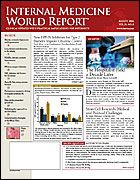Publication
Article
Internal Medicine World Report
Elevated Testosterone Levels Predict cad in Older Women
Author(s):
But the Clinical Implications Still Uncertain
BOSTON—Postmenopausal women with high testosterone levels may be at a significantly increased risk for coronary artery disease (CAD) as well as carotid intimal-medial thickening, according to new data presented at the annual meeting of the Endocrine Society. Investigators, however, are uncertain whether an elevated testosterone level is a marker of cardiovascular disease (CVD) or a mediator of atherogenesis in this patient population.
It is well known that premenopausal women with polycystic ovary syndrome, a condition associated with elevated testosterone levels, are at increased risk of CAD, but it remains unclear whether this elevated risk translates into a greater incidence of CVD later in life.
Anne Cappola, MD, of the University of Pennsylvania School of Medicine, Philadelphia, and colleagues conducted a multicenter observational study in 344 older women (aged 65-98 years) from the Cardiovascular Health Study. Serum total testosterone and free testos-terone concentrations were measured using ultra-sensitive assays.
Women in the highest quartile of testosterone levels were 3 times more likely to have CAD and 3 to 4 times more likely to have significant carotid artery blockage than women with lower testosterone levels.
“These data suggest that late postmenopausal women with higher testosterone levels may need to be concerned about an increased risk of coronary heart disease and significant carotid artery blockage,” said Dr Cappola. “It is difficult to determine whether the higher testosterone levels helped cause the increase in cardiovascular disease or whether testosterone is simply a marker of cardiovascular disease in these women.”
Much more is known about the effects of elevated testosterone levels in men than in women. Currently, there are no accepted standards for what constitutes normal testosterone levels in older postmenopausal women.
In this study, testosterone concentrations among women in the highest quartile were not considered to be severely elevated and may well have been the same serum total testosterone and free testosterone levels that these women have had throughout most of their lives.
IMWR
“It is not clear that if we gave these women testosterone that cardiovascular risk would increase. We can’t say that, or that if you lowered their testosterone levels it would improve their risk. But it is a relationship that we are seeing that we think needs further study and more exploration,” Dr Cappola told . “If this is important, and if this is a mediator, then could it be a modifiable risk factor? Certainly, but there are a lot of ‘ifs’ leading up to that possibility.”





